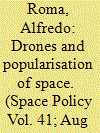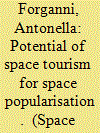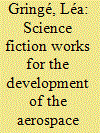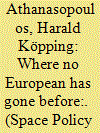|
|
|
Sort Order |
|
|
|
Items / Page
|
|
|
|
|
|
|
| Srl | Item |
| 1 |
ID:
157142


|
|
|
|
|
| Summary/Abstract |
The development of EU space policy and its two main programmes, Galileo and Copernicus, has necessitated a parallel process of legitimization of this policy. Popularization, defined as the simplification of a policy in order to be made accessible to the masses and accepted by them, has been a core legitimising tool in the hands of the European Commission, with regular help from experts/industrialists, or ‘organic intellectuals’. After establishing popularization conceptually, the analysis illustrates instances of both expert-based and non-expert-based popularization at the Brussels level. It concludes that the process of popularization conceals the most controversial aspects of both Galileo and Copernicus while also producing a ‘general interest’ that glues together a disparate set of social forces, in favour of EU space programmes and their manufacturers - the European space industry.
|
|
|
|
|
|
|
|
|
|
|
|
|
|
|
|
| 2 |
ID:
157145


|
|
|
|
|
| Summary/Abstract |
ESA and the UK Space Agency have gone to considerable efforts to promote the Principia mission of Astronaut Tim Peake to school children in the United Kingdom. This paper describes a “Space Day” at an English primary school where, with the consent of the Head Teacher and Class Teachers, children aged around 10 or 11 years old received a modified presentation of the standard Principia presentation, and responded with drawings and written personal statements addressing the question “I want/do not want to be an Astronaut because …”. Accepting the validity of these ephemeral items as an expression of epistemology, these statements and drawings were subjected to a content analysis. In a further process of Critical Grounded Theory the key groupings were compared with established characteristic domains in space exploration (e.g. explorer or advocate). A construct found to be helpful is Foucault's concept of a “heterotopia”, which is discussed in reference to installations of space technology and especially the orbiting space stations. The conclusion looks forward to further application of heterotopia to the popular perception of space travel.
|
|
|
|
|
|
|
|
|
|
|
|
|
|
|
|
| 3 |
ID:
157152


|
|
|
| 4 |
ID:
157143


|
|
|
|
|
| Summary/Abstract |
The popularisation of geo-information services contributes to achieving Europe's 2020 goals to become a “smart, sustainable and inclusive growth economy” [1]. From a utilitarian perspective, this implies making the benefits of geo-information available to the largest number of users possible. To this end earth observation data has been made publicly available by various European earth observation initiatives for the use by industrial actors. However, the potential end-users frequently cannot readily utilize raw earth observation data in their business processes. Hence, to further stimulate the popularisation of geo-information services, a healthy value adding industry – that transforms raw earth observation data to geo-information services – is necessary. This involves the important, yet challenging, alignment between industry activities and government incentives. This paper discusses how a private cooperation of value adding companies in the Netherlands was established to contribute to the popularisation of geo-information services. Our case study shows how structural challenges can be overcome by forming a cooperation among value adding companies to gain the necessary capabilities to link downstream needs (market pull) with upstream availability (technology push). The results elaborate on policy actions for market stimulation, as well as developments within the value adding industry to strengthen and mature their market scope. As such, this study provides insight in how to strengthen the European value adding industry and promote the popularisation of geo-information services.
|
|
|
|
|
|
|
|
|
|
|
|
|
|
|
|
| 5 |
ID:
157151


|
|
|
|
|
| Summary/Abstract |
The article presents drones as new devices used for military and civil purposes. The brief analysis focuses on civil uses of drones and their possible interrelation with space infrastructures. Unfortunately, drones are often known as “killing machines” having in many cases hit innocent civilians in war theatres. However, they can be used to improve security of citizens, for natural disasters prevention, for borders surveillance and mass migration control.
The initial reaction of many people is normally induced by the fear of unknown as often happens for new technologies, especially if they come from the sky. Therefore, it is vitally important to create awareness of aerospace and outer space activities to create social acceptance for such activities. The article presents some actions that can be taken by the competent authorities to help a smooth introduction of drones into the market, including a website to keep a dialogue with the public, actions that can be taken also for any new space activity.
Finally, the article examines some economic aspects that can jeopardise the popularisation of space activities, including drones, and the key information that should be passed on the general public to show how the investments in space activities and infrastructures bring enormous advantages to our daily life, promoting in such a way the popularisation of space.
|
|
|
|
|
|
|
|
|
|
|
|
|
|
|
|
| 6 |
ID:
157153


|
|
|
|
|
| Summary/Abstract |
It is a legitimate question to ask, whether space is really popular in Europe. But why should it be? This viewpoint tackles both the whether and the why. It looks at deficiencies as well as advancements in communicating space to the European public and decision-makers. Before anything else, it provides an idea of the aim to make space (even more) popular in Europe, reflecting the continent's development and identity.
|
|
|
|
|
|
|
|
|
|
|
|
|
|
|
|
| 7 |
ID:
157141


|
|
|
| 8 |
ID:
157146


|
|
|
| 9 |
ID:
157148


|
|
|
|
|
| Summary/Abstract |
This article examines space tourism in the perspective of popularisation of space, to determine its potential role, with a special focus on the possible implications for the development of the EU Space Policy.
After a preliminary analysis of space tourism and an overview of the technology required to make it possible, distinguishing between orbital and suborbital flights, the article outlines some legal and political issues related to this emerging sector and discusses the possible consequences of space commercialisation.
The positive trend and the progress made in this domain suggest that space tourism could actually become a factor of space popularisation. At the same time, the existing legal framework does not seem to efficiently respond to the challenge. Rather than adapting the current air space and outer space rules, it would be preferable to establish a comprehensive special regulation for space tourism.
In the European context, in particular, space tourism could contribute to the evolution of the EU Space Policy, which is still at an early stage, and thus it could have a positive impact on the European integration process.
|
|
|
|
|
|
|
|
|
|
|
|
|
|
|
|
| 10 |
ID:
157147


|
|
|
| 11 |
ID:
157144


|
|
|
|
|
| Summary/Abstract |
The popularisation of space activities is concerned with the public support of, interest in, and understanding of, the benefits to citizens of space science and space exploration. The media, traditional and new, play a significant role in popularising science. While scholars have acknowledged the potential of social media to support public engagement of science, the communication of science by Twitter, a micro-blogging platform or by other social media, is largely under-explored. This paper considers the role of social media in popularising space activities. It focuses on the official Twitter feed of the lander of the European Space Agency's Rosetta Mission (Philae Lander, active between October 2010 and September 2016, to illustrate an instance of popularisation. In particular, it foregrounds a specific element of popularisation, that is, ‘doing science in public’. The resulting analysis illustrates that the topics communicated include themes beyond the overt, expected topic, that is, ‘the journey of the lander’. Additional themes include references to complex scientific experiments (‘space science’) and to the business, or organisation, of science, the earthly ‘backstage’ of Philae lander and the Rosetta mission. The contextual web within which Twitter operates is discussed and the paper concludes by considering the potential role that social media can play in communicating scientific endeavours in space, achieving the goals of informing, enthusing and engaging publics.
|
|
|
|
|
|
|
|
|
|
|
|
|
|
|
|
| 12 |
ID:
157154


|
|
|
| 13 |
ID:
157149


|
|
|
| 14 |
ID:
157150


|
|
|
|
|
| Summary/Abstract |
This article is meant to begin an investigation into the role of Europe and European integration in science fiction. After a brief discussion of methodology, it reviews a number of key novels, films and bandes dessinées of science fiction and analyses their references to Europe and European integration. The references are placed into four categories: surveillance state, conspiracy theories, environmental disasters, and space exploration. References to European integration in this genre are rare and in the case of the first three categories they are dystopian. While this can partially be attributed to a general tendency within the genre towards dystopian storytelling, it is argued that the prevalence of dystopia can also be explained with reference to moral disorientation. A notable exception is made by references to European integration in space-based science fiction, where European integration is seen as contributing towards global collaboration. This representation of European integration provides an alternative outlook on the EU as a vision of global collaboration. Science fiction is arguably not only an important method to popularise space exploration, but also a method to rekindle the European project.
|
|
|
|
|
|
|
|
|
|
|
|
|
|
|
|
|
|
|
|
|